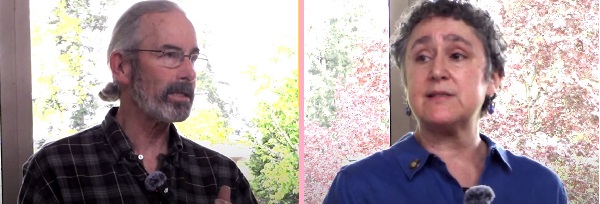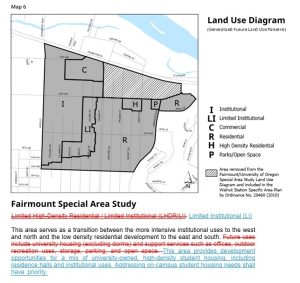Public asks lawmakers how state will protect against federal actions
9 min read
Presenter: At a town hall April 19, a question about how Oregon rights are faring under attacks from the Trump administration. Rep. Lisa Fragala:
Rep. Lisa Fragala: Did people hear the question? It’s addressing the context at the federal level. We’ve all seen the chaos at the federal level and the ways in which certain state practices and rights are being potentially undermined.
[00:00:28] We are seeing a lot of targeting of higher education institutions, particularly universities, but also K-12 with the threats of withdrawing funding. In the Higher Education Committee that I serve on, I would say on a daily basis, we are hearing Republican colleagues attack diversity, equity, and inclusion within the higher education system.
[00:01:01] And so this is something that is becoming more vocal in Oregon, but it is a direct kind of reference to what is happening at the national level, right? This is where the federal government is targeting education.
And I think it’s very politicized and I really think it’s about erasing people, erasing them in terms of their history and their presence, you know, for example, with the Tuskegee Airmen being erased from the website and no longer that information is accessible. But I also think it’s very political in terms of undermining our education institutions.
[00:01:51] And so what are we doing about it at the state level?
[00:01:54] In the House and around education, we are making sure that we continue to protect the programs that we need to protect. Protect our sanctuary laws. Protect our laws that protect the LGBTQ and trans communities, and to ensure that we are also coordinating with efforts at the state level to support our education institutions. A lot of that work needs to happen at the legal level, but we’re also working to make sure that we support the agencies that need to manage these attacks.
[00:02:39] So for example, I recently worked as the vice chair of the Higher Education Committee in the House with some of the agency people in the HECC, which is the Higher Education Coordinating Commission, to change language around grant opportunities for diverse communities, which I just want to point out: Diverse communities, when you look at it in this environment, is about people who are from lower socioeconomic communities. They are rural communities and frontier communities. They include veterans and then they include historically marginalized communities, right? People are not being excluded in this process, which is the claim that will be made.
[00:03:32] Presenter: State Sen. Floyd Prozanski:
[00:03:34] Sen. Floyd Prozanski: Most of you know we have state’s rights, Article 10 of the U.S. Constitution preserves to the state certain components of what we have the ability to control and do: health and education, safety is in those areas.
[00:03:50] What the state is doing is we are seeing all three branches of government—the legislature, the judicial branch, and the executive branch—all working together to ensure the rights that we have here in Oregon are not going to be trampled on by the federal government.
[00:04:08] We have status in this state as a sanctuary state, and this is one of the areas the federal administration is really starting to focus on and we expect and anticipate that we’ll see more direct actions toward us and other sanctuary states.
[00:04:23] But what I’m going to tell you is that Dan Rayfield who is our attorney general has already entered into numerous lawsuits with a bunch of other attorney generals around the country taking on a lot of this approach.
[00:04:35] One of the things that’s very important to me is to ensure that we are not going to lose those rights, that we have the protections.
[00:04:44] I’ve worked as a prosecuting attorney, have done so for 37 years, and I can tell you my working with the individuals who represent law enforcement at the legislature, everyone is on the same page. And that is that we have an Oregon law that says this, and we are not going to go forward and support federal actions that interfere with our rights as state citizens.
[00:05:10] How many people heard this last week of a man named Mr. (Juan Carlos) Lopez(-Gomez), who lived in Georgia, who was a U.S. citizen, born here, lived here for two years, moved to Mexico, and lived there for 14 years, came back when he’s age 16. He now lives where he was born, meaning in Georgia.
[00:05:30] He was going across the state border with Florida. Florida has adopted some law that says that if you somehow come into the U.S. And then you are illegally in the country and you come into Florida, you violate another law. Now, whether or not that’s going to be legal or not, as to my perspective is that immigration laws are preemptive at the federal level and states can’t do that.
[00:05:54] This gentleman was a passenger in a vehicle, gets pulled over because the driver was speeding. He ends up getting picked up and taken into custody. He was there for 48 hours. An American citizen. That’s how bad it’s going to get. We are going to see more pain and more hurt.
[00:06:15] This is where we as a community need to stand together for all of us, because if you say, ‘Well, that doesn’t really pertain to me because that’s not what I do.’ Just remember, if we don’t stand united for everybody, who’s going to stand for us? (That’s right.)
[00:06:32] Presenter: He said the three branches of state government are working together. Sen. Floyd Prozanski:
[00:06:38] Sen. Floyd Prozanski: We are doing everything we can. Can we anticipate each and every thing? No, we can’t. The place where we have to have our hope is, as I said, there are three branches of government. We see right now the executive branch on the federal side is not really doing much of anything. They’re starting to kind of wake up a little bit because their constituents, even in red states, are calling out their representatives, their congresspeople, for the acts that are happening at the federal level in the administration.
[00:07:05] So what we do need to make certain is that we don’t allow these type of intimidations to override what we know is right as citizens and the protection for all of us. So we’re going to do everything we can and we’re going to react as we need to react. But the courts, the branch, that is one that’s going to hold the checks and balances.
[00:07:28] This is why legislation, when you have legislators that want to do what I call flip-flop, move 180 to another back 180, those things don’t happen, or they do happen, they don’t last because our whole system is based on checks and balances.
[00:07:43] And the judicial branch is now starting to stand up for what is right. If you start looking at some of the stuff, I was kind of saying, ‘Well, it’s got to be coming soon.’ Now you have the federal government, you have the federal administration, you have the president and his individuals that are denying that court orders mean what court orders say.
[00:08:03] And this is why we’re seeing pushback across the country. I think we all as Americans, and I think we all as Oregonians, want to make certain the rule of law stands in place. And we cannot just have someone say, ‘I’m just not going to follow that.’ The chaos will be here and it will be bad.
[00:08:20] So we’re going to do everything we can to prohibit that type of interference. And what I will tell you about the law enforcement is that they have told me, they are going to support the state law, the sanctuary that we have in place, and they are not going to do what Florida did—they held this person because ICE said, ‘Oh, we want to put a hold on them,’ and then they basically said, ‘Well, that’s, you know, we can’t stop that.’
That’s why we have a sanctuary law here because we say we have different values to support our citizens.
[00:08:53] Presenter: Another question asked about the Safeguard American Voter Eligibility Act. Recently passed by the House, the SAVE Act would block 70 million women from registering to vote. Sen. Floyd Prozanski:
[00:09:06] Sen. Floyd Prozanski: We clearly have done everything we can in the state of Oregon to make voting access as easy as possible to get people the opportunity to participate. And we have checks and balances there too…
[00:09:19] Regarding what happens on the federal level as to them putting more and more restrictions, I’ll be very frank with you. Even as an attorney I don’t know what is going to be the outcome of a federal law as to how it would impact citizens in any state, as to what they do. I would assume that we would have some type of litigation based on the rights of individuals to seek redress through voting in the country now, but I can’t tell you exactly.
[00:09:50] But what I will tell you is that anything that we have that’s at the state level and at the local level within the state will not, as far as I can see, be impacted by a federal legislation as to state and local voting.
[00:10:08] Presenter: Rep. Lisa Fragala:
[00:10:10] Rep. Lisa Fragala: Thank you for that question. You know that is the cornerstone and foundation of our democracy, right, that people are able to vote.
[00:10:20] One of the perspectives that our leadership in the House has been taking, and they are, of course, coordinating with our state leadership and with leadership in the Senate, is that there’s an emergency response or planning mentality to what we’re experiencing at the federal level, right? And so very very soon after Trump was elected, I mean, people didn’t wait until January or February, when all of this started happening.
[00:10:52] They went to work in November, planning, right, evaluating where the vulnerabilities are, just like you do for any type of emergency planning: looking at agencies to see what agencies might be most specifically targeted, developing scenario planning.
[00:11:10] And just like the Attorney General Dan Rayfield meets on a daily call and has been working with attorney generals in blue states, progressive attorney generals since November to coordinate around protecting our rights, the governors are doing that, and our state leadership is doing that.
[00:11:33] And in the House, we are committed to protecting the rights and the programs that serve Oregonians, right. Our sanctuary laws, we’re committed to upholding those, as well as upholding other basic rights and freedoms that we know are the values of Oregonians.
[00:11:54] So that is something that is happening comprehensively and strategically, and we have to stay focused, right? We can’t be responding to every thing that comes out of the White House. That just makes us spin out and not be very effective. We have to look and be strategic at what is actually happening and what are the things that we can protect and do.
[00:12:22] And so we know that part of the federal administration’s strategy is something called flooding the zone, which is something (Trump advisor Steve) Bannon has talked about, which is sowing confusion and chaos and doing that in a way to undermine effective strategic governance or responses.
[00:12:44] So we are working very hard to be strategic and coordinated and to protect the programs and rights of Oregonians.
One other thing that I would mention in relation to voting rights is that there are efforts at the state level by Republicans to undermine the voting system that we have in Oregon. There is a ballot initiative that sounds like it will be on the ballot to do away with vote by mail. And so that is something that is incredibly popular, but I don’t think we should take it for granted.
[00:13:24] Presenter: The two legislators introduced their staff members.
[00:13:28] Rep. Lisa Fragala: I just wanted to take a moment to introduce one of my staff people. It’s Sabrina Gordon and she works very hard as well to support people who are writing in with challenges that they might have.
[00:13:44] Sen. Floyd Prozanski: My staff Kevin Moore has been with me for 19 years. Lisa’s other lead is Selene Swanson-Harris. She served, worked with me prior to going to work with Lisa. Part of that, she was with Sen. Lee Beyer. So we have very senior staff individuals that are there.
[00:14:06] Presenter: Two Eugene-area legislators take questions from constituents April 19.
Field recordings by Todd Boyle, produced by John Q for Whole Community News, KEPW 97.3, Eugene’s PeaceWorks Community Radio.




